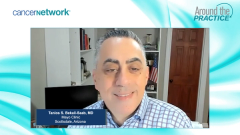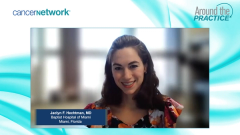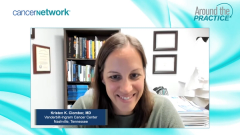
FRESCO-2 Trial: Role of Fruquitinib in Refractory Metastatic CRC
Focused discussion on the FRESCO-2 trial, which analyzed use of fruquitinib in the refractory setting of metastatic colorectal cancer.
Episodes in this series

Transcript:
Cathy Eng, MD: The last few minutes, we’re just going to talk about some generalizations for our audience. Currently, for our patients, once again historically, now, for frontline we have FOLFOX series and options and now we are looking at MOUNTAINEER as a potential option if it ends up being positive in regards for HER2. And as Tony mentioned earlier, there are now trials that are looking, trying to move adagrasib earlier in lines of therapy. We obviously have many options. I want to emphasize we encourage individuals to still enroll to clinical trials. That’s the most important thing for our metastatic patient population. I did want to mention there is also a BREAKWATER trial, which is also for newly diagnosed BRAF (V600E) patients which is also looking at the combination of encorafenib and cetuximab in combination with chemotherapy, so I think that’s also important to emphasize and I forgot to mention that very important phase 3 trial. But Tony, what do you think are the other emerging treatment options in colorectal cancer, what we must look forward to, and if you don’t mind briefly or I am happy to do so mentioning the FRESCO phase 3 results as well that came out.
Tanios S. Bekaii-Saab, MD: Thank you Cathy. You stated all the exciting elements. We are seeing RAF, RAS, HER2. We are seeing all these – MSI high etc. all these targets that continue to emerge and chip away to keep colon cancer into subgroups. Unfortunately, 80% of our patients, you know, have no molecular target to go after or immunologic target. In that sense, for 80% of our patients the discussion is what chemotherapy we start with and what happens after second line or third line if you use FOLFOX or FOLFIRI its second line now. Traditionally, you have had regorafenib in that space, multi kinase inhibitor and oral fluoropyrimidine that has certain characteristics that are favorable, and then congratulations to you and to the group to essentially present the data from FRESCO-2 at ESMO which is certainly one of the noteworthy studies in terms of changing the standard of how we are going to treat refractory patients. I don’t want to be speaking to a study when I have one of the main actors on the study here, but I will summarize, and you can certainly correct me if I go out of line, but FRESCO-2 is – which I tend to do sometimes – but FRESCO-2 is for refractory patients that essentially seen everything. But here's the cool thing about it is it also allowed prior TAS 102 or prior regorafenib and/or. You had to at least fail one of them. And then, patients were randomized 2 to 1 for fruquentinib. Fruquintinib is, again, is a multi-kinase inhibitor that hits a multitude of targets, but primarily VEGF, but also tons of others as all these multi-kinases do. The primary endpoint of the study was overall survival and was met. It was a positive study, essentially, with a median overall survival of 2.6 month, which I think is interesting in this refractory setting. And it has a ratio of.66. That was a positive study, quite positive, in my viewpoint, with toxicities as expected, hypertension. There were very few patients with hand and foot syndrome, but when hand and foot syndrome did happen, it was represented proportionately at a little bit higher rate, almost 6% of patients. The reason I say that is, I don't expect to see a lot of hand and foot – and we were part of the study as well. I don't expect to see a lot of hand and foot syndrome, but if it happens, we need – again, with all patients, we need to preempt and help educate our patients. I think overall quite well tolerated. About half of the patients had prior TAS and about 40% of the patients had both TAS and Rego before they got to fruqintinib, and still manifested that improvement in outcome. Overall, I'm excited about this study. I'm excited also about the potential of having other agents into that mix. And everything that I've seen from the results suggests that it's relatively active and the balance of tolerability is interesting for this agent. And it will become one of my preferred agents in the, once approved, in the refractory setting. Cathy, I don't know. Anything else from your side? You were in the trenches with all of this.
Cathy Eng, MD: It is selective tyrosine-kinase inhibitor of VEGF receptors 1, 2, and 3. But what I do like about the trial specifically is it felt very real world to me. And for a lot of our Phase 3 trials, our patients are really young. They tend to be in the 50s for a lot of our trials. I'm very glad to say that it was very real world. And the median lines of prior therapy was 5. It was as very heavily pretreated population. I'm very glad to see that the results were appreciated by someone else, other than myself. We're very excited about it. And, obviously, we also hope for FDA and EMA approval.
Kristen K. Ciombor, MD: Obviously this trial accrued and enrolled during COVID. And, you know, we've all know that we've had our challenges in the clinical research base during the pandemic on many levels. But the fact that this accrued so quickly and well despite all those challenges, I thought was encouraging.
Cathy Eng, MD: Thank you for bringing that up. And I always do like to mention that, and I should have mentioned that as well.
Tanios S. Bekaii-Saab, MD: Cathy, If you don't mind, I want to add to this. And Kristen just brought up a fantastic point because traditionally, we've always thought that placebo-controlled studies in the US don't accrue well. This debunks the myth especially in settings when we have no options. And that was true in our internal discussion when we were taking on the studies at Mayo. And we found that we can do it and that should not deter us.
Cathy Eng, MD: Thank you for bringing that up. And, obviously, that was a big discussion with patient advocates because that came up. Why is it being compared to placebo because the reality was is we included all patients and we didn't want to exclude any patients based upon prior drug therapies. And there is no standard of care on that setting. Thank you so much for bringing that up. It demonstrates the unmet needs, right, of our Phase 3 patients
Transcript edited for clarity.
Newsletter
Stay up to date on recent advances in the multidisciplinary approach to cancer.












































